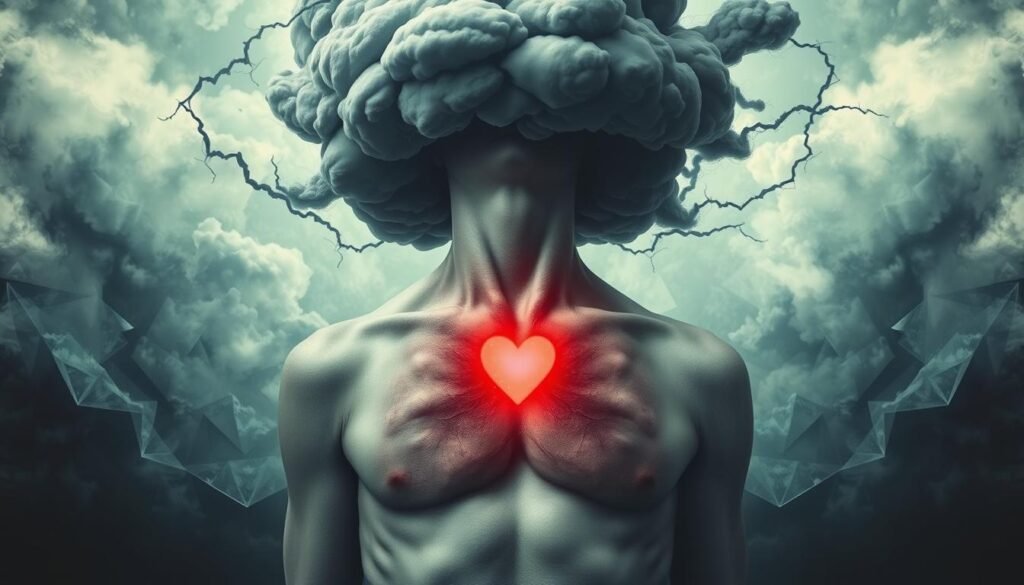Did you know 12% to 16% of people will feel chest pain sometime in their lives? This fact shows how common anxiety-related chest tightness is. Many mistake it for serious health issues. Yet, it often means anxiety. Over three-quarters of people with severe panic attacks mention chest tightness. Knowing this helps separate anxiety from other conditions and find good coping ways.
Tight chest anxiety isn’t just uncomfortable. It’s scary, making some think they’re having a heart attack. But the feelings from anxiety are different from actual heart problems. Anxiety-related chest tightness usually lasts about 10 minutes. It might come with a fast heartbeat, tight muscles, and worry-filled thoughts. Spotting these signs of anxiety is key to managing it.
In this article, we delve into what causes tight chest anxiety, its symptoms, and how to cope. Getting to know anxiety better can empower you. It helps in managing symptoms and cutting down panic attacks.
Key Takeaways
- Tight chest anxiety impacts 12-16% of people at some point.
- Chest tightness is often reported in bad panic attacks.
- Breathing exercises really help with anxiety symptoms.
- It’s important to know how panic attacks differ from heart problems.
- Techniques like journaling and mindfulness are good for handling anxiety.
Understanding Anxiety and Its Physical Symptoms
Anxiety is a complex mental health issue. It causes a constant feeling of unease or fear. Not just in the mind, it also affects the body, causing physical symptoms. These include shortness of breath, a quick heartbeat, and tightness in the chest. Up to 40% of people with chest pain actually suffer from anxiety, not heart issues.
Almost half of those who go to the emergency room for chest pain don’t have heart problems. In fact, 25 to 50 percent might be experiencing severe anxiety, studies say. This link between anxiety and physical feelings can lead to wrong ideas about their symptoms. It’s important to know the difference between stress-related symptoms and serious conditions.
Knowing the physical symptoms of anxiety helps manage mental health. Stress-related symptoms are different for everyone but affect the anxiety experience deeply. Understanding how they connect can lead to better ways to cope and treat it.
For insights on telling apart anxiety-related chest pain and other causes, visit this resource. Learning about anxiety’s physical effects helps people get the right help, improving life quality.
What is Tight Chest Anxiety?
Tight chest anxiety is feeling discomfort or tightness in the chest during anxiety or panic attacks. It makes people feel overwhelmed or scared. This can make their anxiety symptoms worse.
Defining Tight Chest Anxiety
Tight chest anxiety means feeling like your chest is tight, which happens with different anxiety disorders. It can come on suddenly and make people panic more. Many think it’s a serious health issue, but it’s a common anxiety symptom. This worry can make the chest tightness worse, causing more tension.
How Common is Tight Chest Anxiety?
Many people, about 30% of adults, will face anxiety disorders during their life. About 25% of them will feel chest pain from anxiety. Also, 7% of kids between 3 to 17 years old report anxiety issues each year. It’s interesting to note, most anxiety symptoms start before 21 years of age. Chest pain from anxiety usually goes away in 10 minutes for most people, yet it can last up to an hour. Knowing how widespread tight chest anxiety is can help in finding ways to manage it.
| Demographic | Percentage Affected |
|---|---|
| Adults experiencing anxiety disorders | 30% |
| Individuals experiencing chest pain due to anxiety | 25% |
| Children with anxiety issues (ages 3-17) | 7% |
Causes of Tight Chest Anxiety
Tight chest anxiety comes from various causes that trigger your body and mind. Knowing these causes helps you handle anxiety better. Your body might react in different ways, making you feel uncomfortable and worried.
Fight-or-Flight Response
The fight-or-flight response is our body’s natural way of dealing with danger. When you feel anxious, this response kicks in. It sends out adrenaline and cortisol. These hormones make your heart beat faster and increase blood flow, causing chest tightness. This readiness to face danger can make your anxiety worse, keeping the cycle going.
Hyperventilation and Chest Tightness
Hyperventilation often happens with anxiety attacks. It leads to fast breathing that messes with your oxygen and carbon dioxide levels. This can make you feel dizzy and tight in the chest, adding to your anxiety. Knowing this symptom is key. Control your breathing, and you might feel better.
Muscle Strain from Anxiety
With anxiety, you might tense up, causing muscle strain that feels bad in your chest. If you’re always anxious, your muscles stay tight. This makes your chest anxiety worse. Try to relax and move your body. It could help ease the tension and make you feel better.
Symptoms to Recognize
It’s essential to know the symptoms of tight chest anxiety for self-diagnosis and to manage it well. Chest discomfort is a common symptom, but anxiety can also cause other issues.
Physical Symptoms Beyond Chest Discomfort
Besides chest tightness, you might notice other physical signs. These signs include:
- Nausea
- Sweating
- Dizziness
- Palpitations
- Tightness in the muscles
These symptoms often start because of how our bodies respond to anxiety. This response can make the anxiety and its symptoms worse.
Emotional Reactions to Tight Chest Anxiety
Emotional responses are also a big part of tight chest anxiety. They include feelings like:
- Fear or panic
- Feelings of impending doom
- Increased irritability
- A sense of helplessness
Noticing these emotional signs is key. They affect how anxiety feels and how we handle it.

Differentiating Between Panic Attacks and Heart Issues
It’s vital to know the difference between a panic attack and a heart attack. Although they share symptoms, they are not the same. Almost 3% of U.S. adults have panic attacks yearly. These attacks bring on strong physical signs that look like heart attack symptoms. People get anxious, leading to chest pain differentiation issues. It makes figuring out what’s going on tough.
Panic attacks hit suddenly and can end within an hour. Heart attack signs, like chest pressure, might stick around or change over time. Sometimes, women have different signs, like shortness of breath or back pain, when having a heart attack. This makes knowing what’s happening harder.
Stress and anxiety can set off both heart and panic troubles. Anxiety disorders jumped from 8.1% to 36.1% during 2020’s peak pandemic times. This rise has made chest pain differentiation harder. It shows why getting help fast for new discomfort is key for the right care and action.
To pin down what’s wrong, knowing the warning signs helps. Heart attack symptoms might show up after hard work, but panic attacks are less predictable. This is why seeing a doctor, especially with chest pain, is smart. Find out more about the differences between panic and heart attacks here.
| Characteristics | Panic Attack | Heart Attack |
|---|---|---|
| Duration | Several minutes to an hour | Persistent or fluctuating |
| Typical Onset | Sudden and often triggered by anxiety | Can occur during exertion or rest |
| Symptoms | Rapid heartbeat, sweating, fear, chest pain | Chest pressure, squeezing, pain radiating to jaw or back |
| Demographic Trends | More common in women | Heart disease is the leading killer of women |
Strategies for Managing Tight Chest Anxiety
Dealing with chest tightness from anxiety can be tough. But, there are effective ways to feel better. Using breathing exercises, getting regular workouts, and being mindful helps. These tools lessen symptoms and boost calmness.
Breathing Exercises for Relief
Breathing exercises are quick ways to ease anxiety. Box breathing is one technique. You breathe in for four counts, hold, breathe out, and pause for four counts each. It helps lessen tension.
Pursed lip breathing is another helpful method. You breathe in through the nose and out slowly through lips that are almost closed. This steadies your breathing and eases chest tightness.
Engaging in Regular Exercise
Exercise is great for mental health. It helps lower anxiety. Doing thirty minutes of activities like walking or cycling five times a week is recommended. These not only enhance physical health but also release endorphins. These “feel-good” hormones improve our mood.
Utilizing Mindfulness and Meditation Techniques
Mindfulness and meditation clear the mind and relax the body. Staying in the present and using guided or deep meditation reduces anxiety. Soothing music and visualization are mindfulness practices that help calm both mind and body. They bring peace during stress.
Looking for more advice on handling chest tightness? Check out managing anxiety effectively for further information.
Coping Mechanisms to Alleviate Symptoms
Managing anxiety can involve different strategies. These are tailored to meet personal needs. Strategies like journaling and focusing on sleep and nutrition are impactful. They do not just ease anxiety symptoms. They also boost mental and physical health.
Journaling as a Coping Strategy
Journaling is a powerful way for self-reflection. It lets people put their feelings into words. This can help tackle anxiety triggers and enhance understanding of emotions. Engaging in journaling regularly offers emotional release. It brings insights, aiding in coping with anxiety.
The Importance of Sleep and Nutrition
Getting enough sleep and eating right are key for managing anxiety. Lack of sleep can make anxiety worse, leading to more stress. A healthy diet supports the brain and mood. It helps one cope with anxiety better. It’s also wise to cut back on alcohol and caffeine. This can improve mood and sleep quality. Combining good sleep and nutrition forms a solid approach to tackle anxiety.
| Coping Mechanism | Benefits | Tips for Implementation |
|---|---|---|
| Journaling | Enhances self-awareness, reduces negative thoughts | Set aside time daily; write freely without judgment |
| Sleep | Improves mood; enhances cognitive function | Maintain a regular sleep schedule; create a calming bedtime routine |
| Nutrition | Supports mental health; stabilizes energy levels | Incorporate a variety of nutrient-rich foods; stay hydrated |
Using effective coping mechanisms brings real benefits. It can greatly improve how one deals with anxiety. This fosters resilience and the ability to face life’s hurdles.
Seeking Professional Help for Anxiety
Realizing you need professional help is a crucial step in dealing with anxiety. Overwhelming or constant symptoms mean you should see a healthcare provider. Seeing a doctor in time can greatly improve your well-being. Treatment options designed for you can really help with your anxiety.
When to Visit a Doctor
Knowing the signs that you need help is important. Here are signs that show you should see a doctor:
- Persistent anxiety that stops you from doing everyday things
- Having panic attacks or strong physical symptoms
- Feeling unable to relax in peaceful moments
- Constant worries about your health and body
- Always asking doctors for reassurance
If these sound like what you’re going through, a doctor’s visit can offer much-needed help and information. It’s important to get help early for the best management of your anxiety.
Overview of Treatment Options
There are different ways to treat anxiety, each with its own benefits. Here is a table showing some common methods:
| Treatment Type | Description | Benefits |
|---|---|---|
| Cognitive Behavioral Therapy (CBT) | A structured program focusing on changing negative thought patterns and behaviors. | Proven effectiveness in reducing anxiety symptoms. |
| Medication | Includes antidepressants or anti-anxiety medications to regulate mood. | Can give quick relief from severe symptoms. |
| Mindfulness Practices | Techniques like meditation and breathing exercises. | Helps improve self-awareness and emotional control. |
| Support Groups | Facilitated discussions among people facing similar issues. | Provides a feeling of community and shared understanding. |
Following a structured plan with a professional’s help lets people manage their anxiety better. Finding the right therapist is key to recovery.

Medical Considerations in Tight Chest Anxiety
Tight chest anxiety can deeply impact someone’s health. It’s vital for those feeling these symptoms to understand the medical side. Anxiety isn’t just in your head. It shows up in physical symptoms like chest tightness too. Making sure there are no other health risks is essential for correct diagnosis.
Anxiety is a key factor in heart disease risk, says Dr. Una D McCann from Johns Hopkins Bayview Medical Center. It can cause a fast heartbeat, high blood pressure, and less heart rate variability. These effects increase the risk of sudden heart attacks and heart failure. Understanding anxiety’s medical effects is key.
Women face anxiety disorders like panic attacks and PTSD more than men. This increases their health risks. Such issues may come from past traumas, raising the chance of anxiety-related heart problems. Genetics can also make people more likely to have both anxiety and heart conditions. This shows why thorough medical checks are needed.
For heart palpitations not caused by heart issues, anxiety is often the culprit. Meeting with a health professional is important. Managing anxiety well can help those palpitations and improve heart health. Treatments like medication and therapy can ease anxiety disorder symptoms effectively.
| Medical Factor | Health Risk |
|---|---|
| Rapid Heart Rate | Increased risk of cardiac events |
| Increased Blood Pressure | Potential for heart disease |
| Decreased Heart Rate Variability | Elevated risk of sudden cardiac arrest |
| Poor Recovery from Heart Issues | Impedes adherence to treatment |
| Genetic Predisposition | Higher likelihood of anxiety disorders |
Self-Care and Lifestyle Changes
Adopting self-care strategies is key to handling tight chest anxiety. It helps to adjust daily routines and seek emotional support. This enhances well-being. Focus on managing substances like alcohol and caffeine. Also, talking to a therapist can be very helpful.
Limiting Alcohol and Caffeine
For those with anxiety, cutting down on alcohol and caffeine is crucial. These substances can make anxiety worse. By managing them, one may sleep better and feel less anxious. It’s wise to limit caffeine and establish healthy routines, especially at night.
Finding Support through Talk Therapy
Talk therapy offers a safe space to share feelings and find ways to cope. Talking with a professional helps identify anxiety triggers and encourages helpful lifestyle changes. Studies show therapy is effective in managing anxiety. It gives tools for daily life, boosting self-care and emotional health.

Long-term Strategies for Anxiety Management
Handling anxiety over the long term requires a plan. This strategy helps ease symptoms right away and cut down on anxiety attacks. Regular exercise is key. Studies show that working out, no matter how intense, reduces stress. It’s good to aim for 75 minutes of hard exercise or 150 minutes of moderate exercise each week. This improves mental health.
For quick relief, short bursts of exercise help during stressful times. Quick walks or body-weight exercises are good for battling anxiety. Mindfulness and meditation are also important. They help focus the mind and promote calm, helping to relieve anxiety and its effects on breathing.
Different kinds of talking therapies, like CBT and ACT, offer great ways to deal with anxiety’s root causes. These therapies help change negative thoughts that lead to feelings like chest tightness and shortness of breath.
Medicines can also support anxiety management. Antidepressants are often used, but they take time to work. Buspirone is a safer option that helps lower anxiety over time.
Practicing diaphragmatic breathing daily can also help calm the mind. Yoga or creative hobbies like making music can shift attention from anxiety. Even a playlist tailored to your taste can be a fun way to relax.
Conclusion
It’s important to understand tight chest anxiety for better health. People who feel this way should know it’s common. It causes both physical and mental reactions.
Using deep breaths, relaxing muscles slowly, and staying mindful helps ease the anxiety. These steps lead to relief.
Being active and living a healthy life also plays a big role. It helps one manage anxiety better. Moreover, seeking professional advice through Cognitive Behavioral Therapy (CBT) or considering medicine might offer long-term help. Joining support groups brings added benefits, offering support and tips.
Acknowledging the signs of tight chest anxiety and applying these tips can improve one’s control over their feelings. The right approach and support make dealing with anxiety possible. Managing anxiety well is achievable with the correct support and tools.